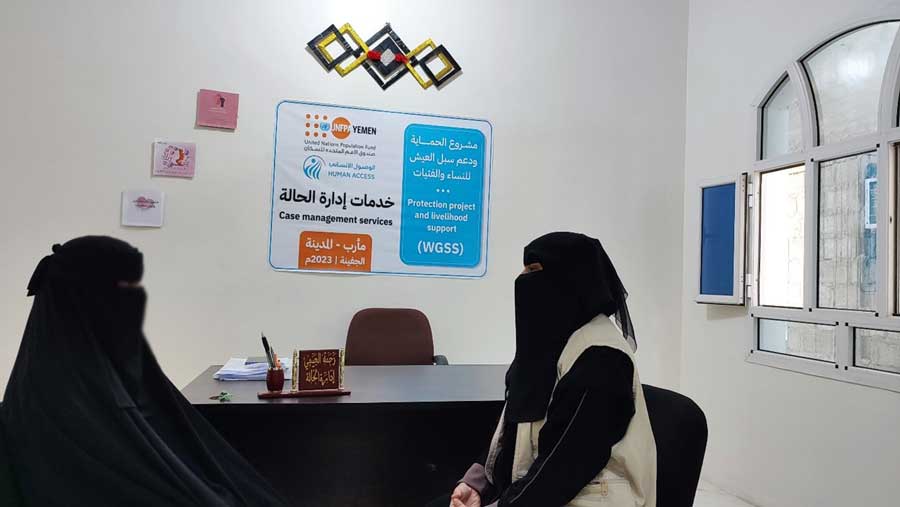
She was crying out of her helplessness, and her flowing tears were an accurate translation of a human condition suffering from the treachery of days.
She lives a bleak life in an overcrowded camp for displaced people, as she runs out of options in an extremely difficult environment, and her need for a safe space intensifies under dangerous conditions.
She is the displaced woman (A.L.), 35 years old. Her name is encoded in this story to protect her identity.
She is a mother of two daughters. She lived through a very harsh experience, and despite the suffering she faced, she reached the light at the end of the tunnel thanks to HUMAN ACCESS.
The following are some of the chapters of her tragedy and success.
Tragedy of displacement and violence
As a result of the ongoing conflict in Yemen, (A.L) was forced to flee with her husband in search of a safe haven.
They settled in Al-Jufaina camp in Marib Governorate, which hosts millions of displaced people who suffer a harsh life, with increasing needs for life-saving humanitarian assistance and protection, since the most affected groups are women and children.
It wasn't just the extreme heat in the desert, the miserable living conditions in crowded camps, and the lack of the most basic daily necessities that caused her suffering. Rather, additional suffering was added to her in the form of her husband’s violence. This gender-based violence is widespread, and perpetrators often go unpunished.
(A.L.) tried to endure it, fearing for the future of her two children, but her husband’s violence increased, so she resorted to informing her family.
She was shocked when she saw how little interaction her family had with her, and they advised her to be patient since she is displaced and must endure the suffering until the humanitarian crisis eases and the displacement status ends.
Since her husband went further, she had no choice but to break the restrictions, move in with a relative, and seek divorce and custody of her daughters from the court.
She had to fight this battle stripped of the elements of strength until humanitarian aid reached her through the protection and livelihood support project “Safe Space for Women and Girls”, which is managed by HUMAN ACCESS, with funding from the United Nations Population Fund (UNFPA).
Restore self-confidence
In the midst of the harsh battle she was waging, the safe space for women and girls was holding an awareness session in Al-Jufaina camp, and (A.L.) was one of the attendees.
In that moment, a very excellent idea came to her mind, which was to seek refuge in this safe space, perhaps finding support and protection, since she was a vulnerable displaced person and didn't want to live with host families that were overburdened.
Indeed, she reached the safe space while crying over the injustice of time and saying: “I hated life. Even my family did not support me. I do not know what to do, and I do not know how I will live.”
Here the recovery phase began, and its first chapter involves psychological support, as the woman suffers from severe trauma and she must be supported psychologically in order to be able to continue life.
Afterward, legal assistance was provided to her, as many women lack knowledge about their basic legal rights, particularly those related to divorce and custody.
The most successful way for her to achieve financial independence and build a new life is through economic empowerment, so she was trained and qualified in sewing and given the basic requirements to practice the craft and engage in the labor market.
(A.L.) became self-reliant and earned a living through her craft profession to secure the needs of her two daughters.
She told us that this support gave her strength, saying, "I felt dignity. My situation is different now than before. I regained my self-confidence, and I was able to continue my life."
She is grateful to HUMAN ACCESS and UNFPA for the safe space that has already served as a safe haven for so many vulnerable women and girls.


